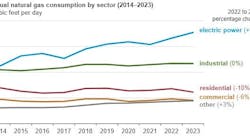Peter Howard Wertheim
OGJ correspondent
RIO DE JANEIRO, June 7 -- Companies were putting major gas projects on hold in Bolivia June 6 as the country's president, under pressure to nationalize the oil and gas industry, offered again to resign.
Street protests and urban blockades have crippled the 19-month-old government of President Carlos Mesa.
The Bolivian Congress can accept or reject the resignation. Observers said it probably would accept Mesa's offer to leave office. Protests are greater now than they were in March when Mesa first resigned in a move Congress rejected (OGJ, Mar. 6, 2005, p.26). And his party no longer has a majority in Congress.
Lawmakers had hoped to calm tensions with an increase, resisted by Mesa, in the effective tax rate on oil and gas production to 50% from 38%. The move touched off calls for nationalization, which escalated into the current crisis.
The Bolivian Chamber of Hydrocarbons, an industry association, expressed "great concern and frustration" about the law in a communiqué. "That decision will negatively affect future investment and the development of the industry," it said.
Brazil's Minister of Mines and Ministrer Dilma Rousseff said state-owned Petroleo Brasileiro SA (Petrobras), the largest foreign investor in Bolivia, would cut its investments, including freezing the $1.5 billion petrochemicals project on the Bolivia-Brazil border.
Repsol YPF said it would shelve $850 million in future Bolivian projects. In a communiqué, Repsol said funds had been allocated for exploration and production before Bolivia enacted the hydrocarbons law containing the tax increase.
According to the US Energy Information Administration, Petrobras holds 43.2% of Bolivia's 53.3 tcf of gas reserves, Repsol-YPF 26%, and Total SA 14.9%.
"The challenge now faced by Bolivian operators is how to monetize their already stranded gas in face of the new tax environment," said Wood MacKenzie analyst Gareth Ellis in a report estimating that the new law will increase tax payments by foreign oil companies by $240 million/year. It said the new tax will cut Repsol-YPF's cash flow by $95 million/year and Petrobras's by $53 million/year.
"Although government revenues will increase in the short term, the tax increases are likely to deter participants from making the large capital investments required in infrastructure to develop Bolivia's gas industry, resulting in lower government revenues in the longer term," Wood Mackenzie said.
